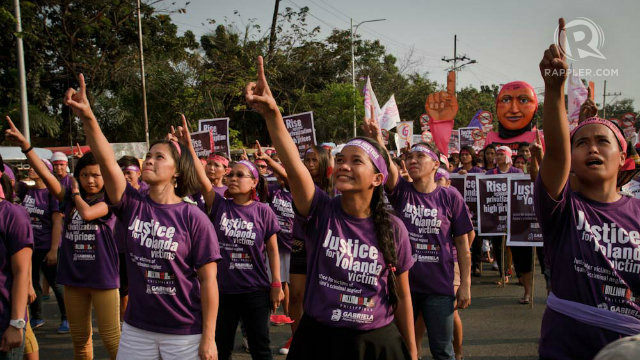SUMMARY
This is AI generated summarization, which may have errors. For context, always refer to the full article.

MANILA, Philippines – Five years ago Lisa (not her real name), 18 years old then, was raped by a local politician from her province. Afraid and threatened, she didn’t dare speak the truth.
She was afraid that they would get back at her and kill her if she complained. But beyond fear, she felt shame. How would people judge her once they know the truth?
It got worse when she got pregnant. When she gave birth Lisa said it both felt like a curse and a gift. “When I finally spoke about it, they wanted to bribe me with P100,000 but I didn’t cave in,” Lisa said in Filipino.
Unfortunately, justice moved slowly and rigorously for Lisa. She had to transfer her case from her hometown to the Department of Justice before a warrant was issued to the politician.
However, the perpetrator remains at large.
According to the organizers of One Billion Rising (OBR), injustice thrives as a worldwide epidemic that either causes or reinforces cases of violence against women (VAW).
Hoping to finally eradicate VAW, Lisa, along with hundred activists moved in unison to the beat of Bangon (Rise), the official dance song for the OBR event on February 14.
“Sumali ako sa OBR para tumindig at bumangon sa nangyari sa akin, hindi lang para sa aking sarili, kung hindi para na din sa mga taong nakaranas ng kaharasan,” Lisa said. (I joined OBR to rise and fight against VAW, not just for myself but also on behalf of the people who were either beaten or raped)
The OBR movement in the Philippines is spearheaded by Gabriela Women’s Partylist, New Voice company, Migrante, Salinlahi and other grassroots groups.
Rising for justice
Along with New Zealand and Australia, the Philippines launched the event that was also planned in 207 countries on Valentine’s Day this year.
With the sun as their spotlight, women, students, teachers and school personnel gathered and danced in UP Diliman for the major OBR gathering in the Philippines. Simultaneous events also took place in other parts of the country, turning major cities like Baguio, Davao, Iloilo, Dumaguete and Cebu into dance floors for protest.
The program in UP Diliman lasted until 9 pm on Friday, February 14, and was filled with songs and various dance numbers.
According to Monique Wilson, stage actress and world coordinator for the One Billion Rising, other countries look up to the Philippines as being the only country that was able to organize several build-up events before February 14.
“We danced in places that denied people justice like mines, seasides and government offices. Even inmates from the Bicutan prison also joined the cause,” Wilson said in Filipino.
V-men, men rising against VAW and injustice, also joined the cause.
“Hindi natin kilangan maging kamukha ni John Lloyd para mahalin ng kababaihan, kailangan lang nating makiisa sa laban nila,” Prof Gerry Lanuza of UP Diliman also noted how the OBR grew and strengthened since its first year. (We don’t have to look like John Lloyd to earn the love of women. All we need is to be one with their cause)
Wilson said one in 3 women on the planet will be raped or beaten in her lifetime. In some parts of the world, girls are raped as many as 60 times a day.
Beyond increasing awareness on the issue of VAW, the OBR this year aims to tackle injustice and the culture of impunity which, according to the organizers of the event, are the root causes of VAW.
“We are escalating the call from violence against women to the larger issue of injustice. Hindi tayo hininto hanggang makakuha tayo ng katarungan,” Wilson said. (We will not stop until we achieve justice)
In the Philippines, the OBR movement is rising against corruption and for the victims of typhoon Yolanda.
Global event
Other OBR movements happened in other places across the world, each fighting injustice unique to their country.
According to Wilson, in Peru, people are rising against sexual harassment. In Miami and Atlanta, people are fighting against sex trafficking.
The OBR global event originated from the V-Day movement and Vagina monologues established by playwright, thespian, and activist Eve Ensler 16 years ago.
Speaking at a tele-briefing, Ensler said they don’t want to continue celebrating V-Day. Instead, they want to put an end to VAW.
“So I asked myself, how can we escalate our efforts where we eradicate violence against women? While in Congo dancing with women performing the Vagina monologues, I had a vision of the 1 Billion women who will be raped or beaten in their lifetime rising and dancing to end violence against women,” Ensler’s vision gave birth to the OBR movement.
Last year on February 14, around 202 countries participated in the first OBR global movement.
“Among other things, what the One Billion Rising movement has done is create world solidarity and world energy that has not only not stopped, but continued to grow since last year’s action,” Ensler added.
Through the One Billion Rising, the organizers hope to increase awareness, reinforce existing efforts, and bring new activists into the fight against VAW.
OBR events in the Philippines are sustained until to March 8 or the World Women’s day. – Rappler.com
Add a comment
How does this make you feel?
There are no comments yet. Add your comment to start the conversation.